'Essex Man' 2015: Does the Thatcher-era stereotype still pack a political punch?
- Published
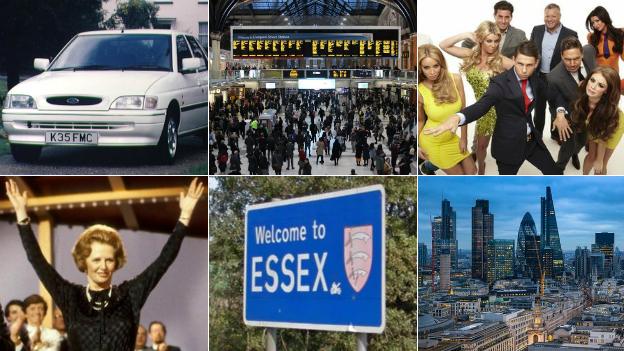
From "Essex Man" days to hit TV show The Only Way is Essex, the county has always attracted attention
Margaret Thatcher's "Essex Man" was a brash City worker who owned a Ford Escort and was key to Conservative success. The world has moved on since then, but has Essex Man moved with it? And is he relevant to 2015's general election?
When journalist Simon Heffer wrote an article about Essex Man in 1990, the stereotype he described was "young, industrious, mildly brutish and culturally barren".
This confident self-starter would once have been more likely to vote Labour, but backed Mrs Thatcher through the 80s when her economic policies increased his wealth and social mobility.
Fast forward a quarter of a century and Essex is still seen by many as a political barometer, regularly visited by high profile candidates and party leaders seeking to turn voters' heads and build support.
It is Essex Man himself, however, who appears to have undergone a bit of a change.
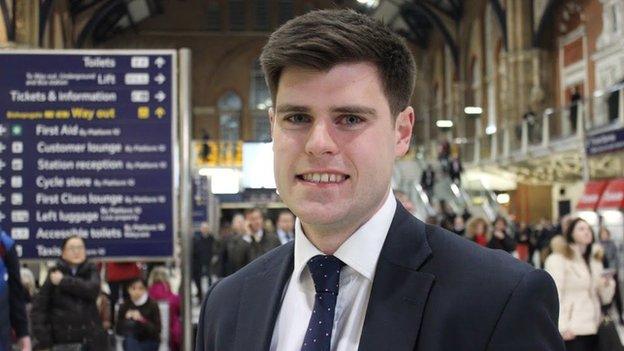
Alex Otoka commutes to his job in the City of London from his family home in Billericay
Alex Otoka could be described as the 2015 version of Essex Man.
Like many of his 1980s predecessors, he works in the City and lives in Billericay, a town thousands of commuters call home.
Mr Otoka has followed both his parents into a job in insurance- a "good, safe job to be in" - and enjoys watching Arsenal play at the weekend.
But that is where the similarities with his Thatcher-era counterpart end.
Unlike the self-made men of his parents' generation, Mr Otoka went to university, where he spent three years studying business economics with marketing.
And while he was there, he joined thousands of others in giving his first-ever general election vote to the Liberal Democrats.
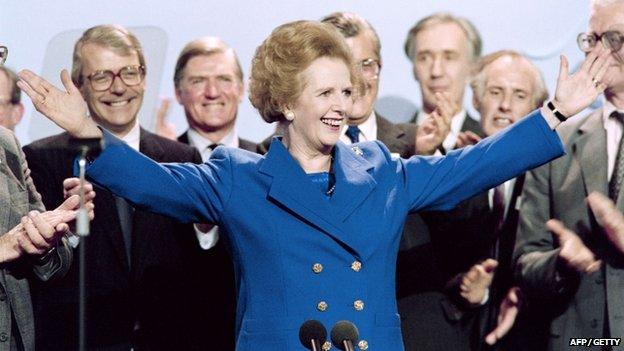
The Iron Lady won three successive elections, due in part to the support of "Essex Man" through the 1980s

The dictionary definition of Essex Man
A term used to denote a supposed new type of Conservative voter, to be found esp. in London and the south-east of England in the late 1980s, typically (esp. contemptuously) characterized as a brash, self-made young businessman who benefited from the entrepreneurial wealth created by Thatcherite policies

"At the forefront of my mind then were education issues. I was very orientated towards what was going to happen with tuition fees, higher education. It drew me towards the Lib Dems," Mr Otoka said.
"Voting for them completely felt like a wasted vote, because they turned their back on what they said they were going to do.
"It's once bitten, twice shy."
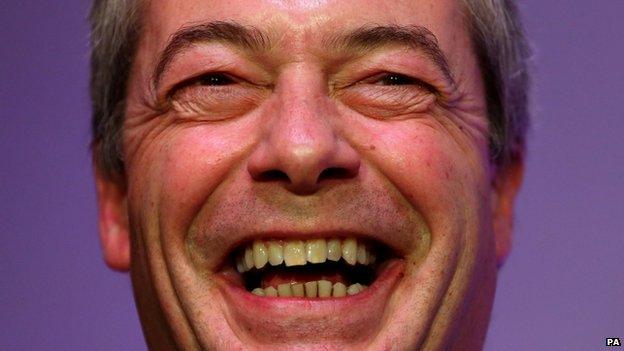
The idea of Nigel Farage's party winning seats was described as "scary" by Essex voter Alex Otoka
This 2015 version of Essex Man is not keen giving his vote to UKIP either, whose rise he describes as "scary".
"Nigel Farage has never been an MP, so he's very inexperienced. They've never been in power. It's a whole new world."
Mr Otoka said he was concerned about reports the party was planning on removing racial discrimination laws in the workplace.
"That's scary. I've got Polish heritage, so without immigration, I wouldn't be here," he said.

Is Essex the 'only way'?
Writer and journalist Pete May, author of The Joy of Essex, described the media as "a bit obsessed" with the county - an idea demonstrated, he said, by visits from David Cameron, Ed Miliband and Nick Clegg on the same day in 2012.
Mr May believes party leaders are "out of touch" with Essex Man, who will identify more closely with "self-made" politicians who have not come from a privileged background.
He believes Essex has an "aspirational" image; its people "genuine and honest".
"That's why politicians are interested in talking to people from Essex - they tell it like it is, and there's a sense of 'grafting'. Even some of the stars of The Only Way is Essex have gone on to open their own businesses, salons, clothes shops - it shows that in-built sense of work ethic," Mr May said.
Read Pete May's 'Joy of Essex' blog, external

Mr Otoka, 25, hopes to move out of the family home, get a mortgage and buy a house with his girlfriend.
"I think the average age to get your first property is something ridiculous like 33. It's scary. It's 25 years or more of your life when you'll have to pay off debt. You want to know you're voting for someone who's going to care about that and not screw you over," he said.
He is also concerned about local issues, like the proposed closure of Billericay police station and the streetlights going out between midnight and 05:00 each night.
"Even as a 6ft 3in (1.9m) male, I don't want to be walking along the road without that protection of having lights there. And I wouldn't want my mum, sister or girlfriend to be walking down them either.
"The Labour candidate for Billericay, part of his personal manifesto is to oppose the closure of the police station, so that's definitely something that's in my mind. But it's one of those things that makes up the whole picture of my political views."
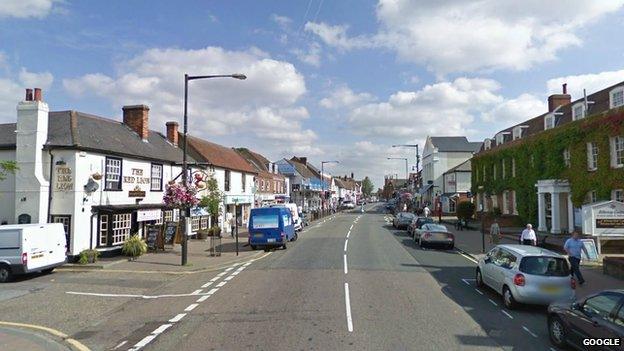
Mr Otoka and his family live in Billericay, a town home to thousands of commuters
Paul Whiteley, a professor of government at the University of Essex, believes the concept of Essex Man can no longer be applied when talking about people's social characteristics.
"It all depends on how you interpret 'Essex Man'," he said. "If people have an image of a white van man, who has tattoos and is working class, that's not a good model to make political predictions.
Going back a few decades, he said, people could be more easily grouped by their social characteristics. And certain social groups voted for certain parties - but that's no longer the case.
"Instead, if you look at how people feel the government is going, what it's achieved, what it's likely to do - that's much more potent as a predictor, in a context where there's much more choice of who to vote for," Prof Whiteley said.
He said deprived Essex communities which felt they had been "left behind", such as Jaywick or parts of Canvey Island, were more "open to an appeal from a party like UKIP" than prosperous areas of the county.
"What we're seeing now is 'issue communities' who make decisions based on how they value a party's performance, rather than basing political choice on people's social backgrounds," he said.
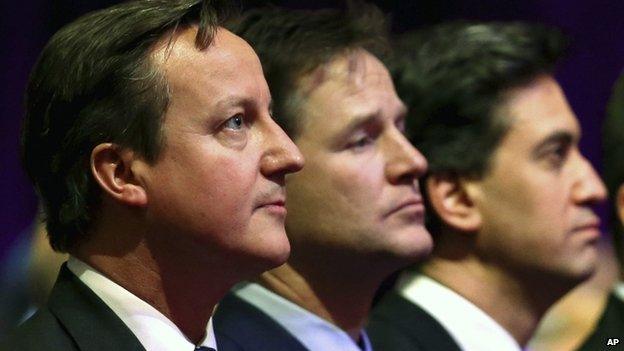
David Cameron, Nick Clegg and Ed Miliband all visited the county on the same day in 2012
So who will Mr Otoka give his vote to? One thing is for certain - his decision is nowhere near as clear-cut as that of the traditional Essex Man.
He plans to start paying more attention to the election "a couple of weeks before, as bad as it sounds".
"That's when I'll start thinking about where I'm going to place my allegiances. The TV debates will make for interesting viewing, they might be fiery," he said.
- Published17 April 2013
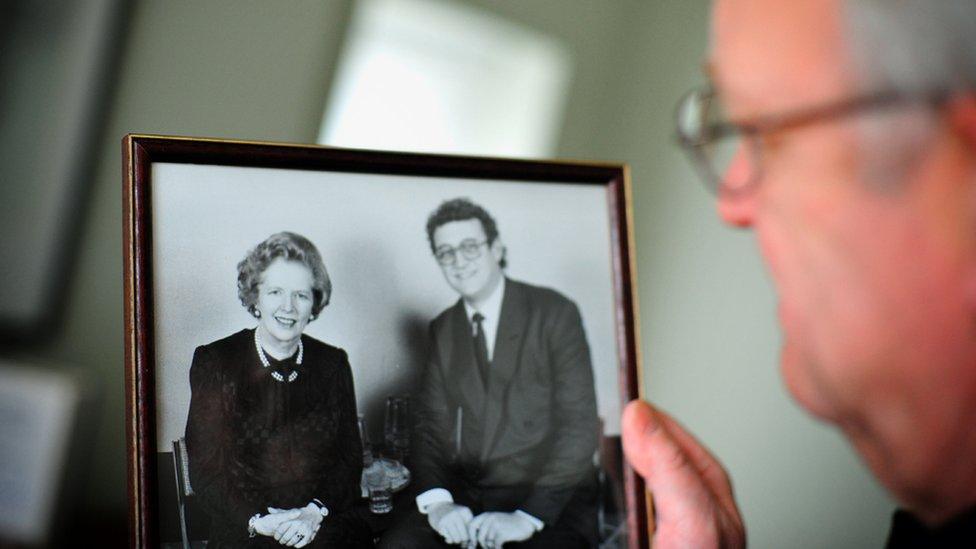
- Published9 May 2012